God and Man and Monkey at Yale
Academia and the media usually view Darwin’s theory of evolution as a fact, a concept so thoroughly established as to be beyond serious challenge. Yet in an Introductory Biology class, when the professor asked: “How many here believe that God created man?” just a few hands went up. He then said, “I have to admit that it takes as much faith to believe in evolution as it does to believe that God created man.”
Charles Darwin
(1809 – 1882)
A measure of humility is required, therefore, of any person investigating such matters, as reflected in the Lord’s words to Job in chapter 38, verse 4, “Where were you when I laid the earth’s foundation?”
God and Man and Monkey at Yale
Academia and the media usually view Darwin’s theory of evolution as a fact, a concept so thoroughly established as to be beyond serious challenge. Yet when a good friend who is now working in inner city medicine in Chicago, Dr. Wayne Detmer, attended his Introductory Biology class at Yale, the professor asked the class: “How many people here believe that God created man?” Just a few hands went up, six or so, out of about 150. The professor then said, “I have to admit that it takes as much faith to believe in evolution as it does to believe that God created man.”
That professor is not alone in having doubts.
Consider the meaning of the word “science.” Webster’s New World Dictionary defines science as, “systematized knowledge derived from observation, study, and experimentation carried on in order to determine the nature or principles of what is being studied.”1 Within its realm—inferring theories from observable facts—science is marvelous. However, the greatest scientific problem with investigating the origin of life and the universe is that none of us were there. We cannot go back in time nor accurately reproduce the conditions under which life began, let alone how it developed thereafter.
If archeology is forced to draw its conclusions based on a fraction of the original evidence, how much more must the study of origins make educated guesses based on trace evidence left behind over the ages.
In teaching AP Statistics, I warn my students about conclusions based on extrapolation: estimating the unknown on the basis of known behavior. Extrapolation can produce highly misleading and unreliable conclusions, conclusions that are handled cautiously in all fields—except, it seems, in the study of origins. We can only estimate what happened in the development of life and why, with a large margin of error. A measure of humility is required, therefore, of any person investigating such matters, as reflected in the Lord’s words to Job in chapter 38, verse 4, “Where were you when I laid the earth’s foundation?”
While the intelligence of those who question evolution for religious reasons (or even academic ones) is popularly ridiculed, many scientists and others who hold to the theory of evolution guard their turf with a religious zeal that is itself suspect.
The Oxford zoologist and champion of evolutionary science, Richard Dawkins, wrote that, “Darwin made it possible to be an intellectually fulfilled atheist,” that is, Darwin’s theory supported his particular perspective on religion. While critical of the “intolerance” of creationists, this same man also exclaimed, “It is absolutely safe to say that, if you meet somebody who claims not to believe in evolution, that person is ignorant, stupid or insane (or wicked, but I’d rather not consider that).”2
The Origin of The Origin
Darwin’s motivation for writing The Origin of Species by Means of Natural Selection was itself not altogether scientific. Before his beloved daughter Annie died, he had held an essentially Christian view of the world, though a more naturalistic and materialistic perspective had been growing within him for years. Darwin refused to accept ten-year-old Annie’s death as something that the Almighty understood better than he did, and rebelled against a God he viewed as cruel for allowing such suffering.
In his Introduction to Origin, Charles Darwin wrote, “the view which most naturalists entertain, and which I formerly entertained—namely, that each species has been independently created—is erroneous.”3 Unlike Job who, after losing his children, said, “The Lord gave and the Lord has taken away; may the name of the Lord be praised” (Job 1:21), Darwin determined to find an explanation for life and the universe that did not require the existence of the God with whom he was so angry. In 1859, he wrote to Sir Charles Lyell, “I would give absolutely nothing for the theory of Natural Selection, it if requires miraculous additions at any one stage of descent.”4
In his recent book, Darwin, His Daughter, and Human Evolution, Randal Keynes, Darwin’s great-great-grandson, states that, “After Annie’s death, Charles set the Christian faith firmly behind him. . . . He did, though, still firmly believe in a Divine Creator. But while others had faith in God’s infinite goodness, Charles found him a shadowy, inscrutable and ruthless figure.” As a young man Darwin had “noted the ‘pain and disease in [the] world’ without further comment.” But when he returned to the theme in the years after Annie’s death, “he wrote about it in a new way. He never referred directly to his personal experience; that would have been quite inappropriate. But he made some new points; there was a darkness in the wording of some passages, and others echoed his feelings about human loss.” One of the most critical of these new points was the survival of the fittest: “Charles continued to work on the ‘laws of life,’ but was now sharply aware of the elimination of the weak as the fit survived.”5
After his beloved daughter Annie (left) died, Darwin refused to accept her death as something that the Almighty understood better than he did, and rebelled against a God he viewed as cruel for allowing such suffering.

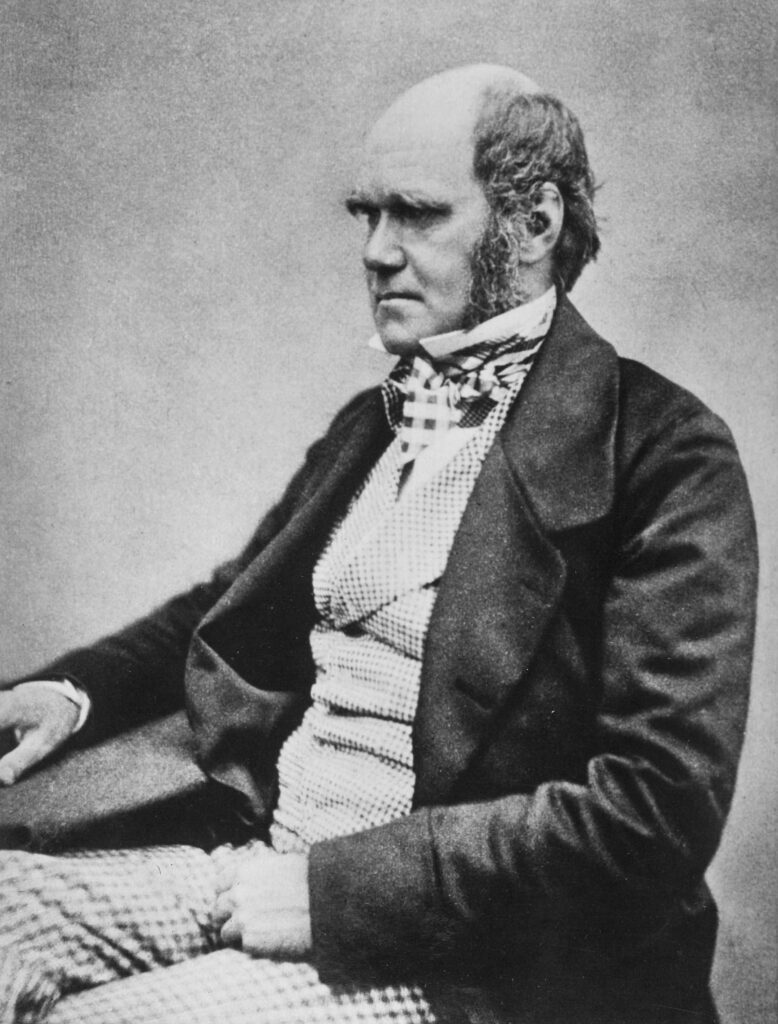
Another of the points Darwin focused on more resolutely was his view of man as an animal. His daughter Etty wrote after his death that his “habit of looking at man as an animal had become so present to him, that even when discussing spiritual life, the higher life kept slipping away.” In Keynes’s words, “Etty was right to suggest that this habit undermined his thinking about ‘the higher life’; he was developing his own ideas about human nature at the same time, deep rather than high, to put in place of the claims of Christianity.”6
By the time Darwin wrote The Descent of Man, the “darkness” in his views of man included a strong element of racism and even the promotion of eugenics. He admitted that there was a “great break in the organic chain between man and his nearest allies [the primates], which cannot be bridged over by any extinct or living species.” He also acknowledged that the existence of such a large gap had “often been advanced as a grave objection to the belief that man is descended from some lower form.”7 Nevertheless, he was not at all troubled by the size of this gap. In fact, he anticipated that the break in the evolutionary chain would get even larger as the higher “races” of mankind actively eliminated the lower “races.” “At some future period, not very distant as measured by centuries, the civilised races of man will almost certainly exterminate and replace throughout the world the savage races. At the same time the anthropomorphous apes . . . will no doubt be exterminated. The break [between man and his nearest allies] will then be rendered wider, for it will intervene between man in a more civilised state, as we may hope, than the Caucasian, and some ape as low as a baboon, instead of as at present between the negro or Australian and the gorilla.”8 Looking back from this side of the Holocaust, those are some very dark words indeed.
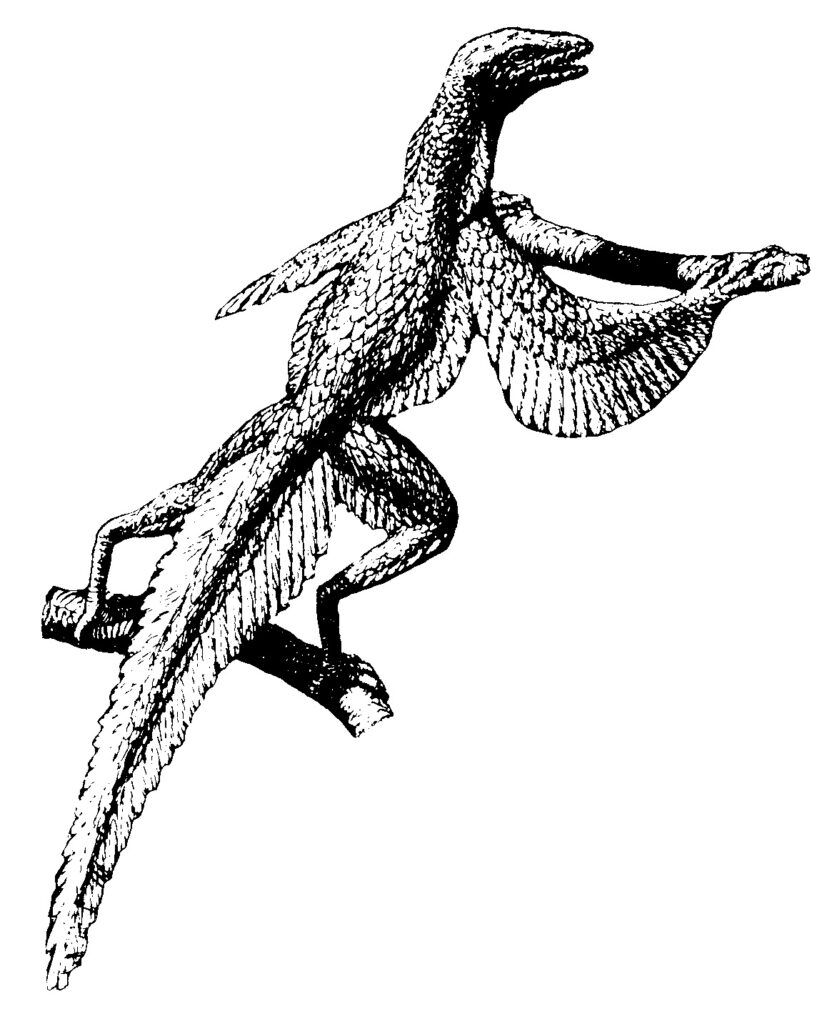
Gerhard Heilman postulated in Origin of the Birds (1926) that transitional organisms such as the Pro-avis must have existed to bridge the evolution from reptiles to birds.
Opposition to The Origin
Darwin apologized at the beginning of Origin for not being able to include all the facts on which he based his conclusions, especially regarding natural selection. He admitted, “For I am well aware that scarcely a single point is discussed in this volume on which facts cannot be adduced, often apparently leading to conclusions directly opposite to those at which I have arrived.”9
What many do not know today is that the chief opposition to Darwin’s theory at its writing arose not from religious believers, but from scientists. Many of his fellow naturalists drew very different conclusions from the same set of evidence he used. As Dr. William W. Wassynger wrote in the “Letters” section of The New York Times on December 15, 1989, “Even in Darwin’s day, scientists who opposed evolution were charged with irrationality and religiosity. But they did not attack evolution on religious grounds; rather, they protested its lack of scientific proof and pointed to the evidence that supported a typological nature,” namely, the fossil record’s clear support for the classification of organisms by distinct types rather than by Darwin’s claim of common descent.
Most geologists of the time believed in catastrophism, “the theory that geological changes have been caused in general by sudden upheavals rather than by gradual changes.”10 Gradualism is critical to Darwin’s theory since, as he admitted, “If it could be demonstrated that any complex organ existed, which could not possibly have been formed by numerous, successive, slight modifications, my theory would absolutely break down.”11
Richard Dawkins acknowledges that evolution may not be gradual in all cases, but states that it must be gradual when explaining “the coming into existence of complicated, apparently designed objects, like eyes. For if it is not gradual in these cases, it ceases to have any explanatory power at all. Without gradualness in these cases, we are back to miracle, which is simply a synonym for the total absence of explanation.”12 At least it is an absence of explanation to an atheist!
A measure of humility is required of any person investigating the origin of life, as reflected in the Lord’s question to Job:
“Were you there when I laid the earth’s foundations?” Job 38:4
Coincidentally aligned spiral galaxies NGC 3314. Photo courtesy of NASA and NSSDC.
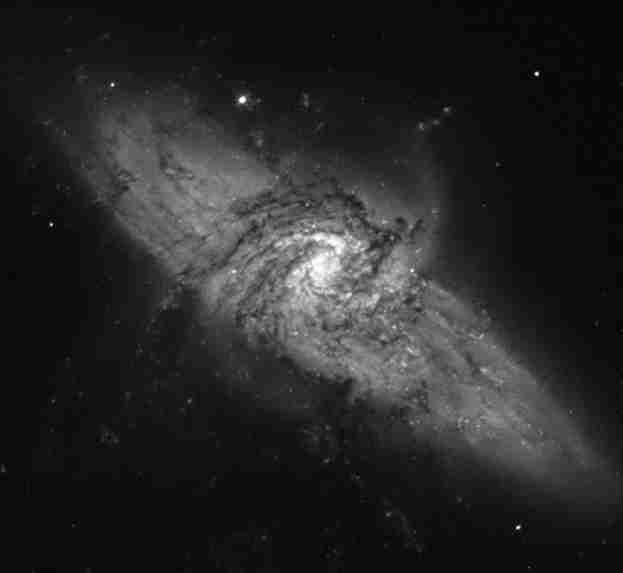
Geologists like Benjamin Silliman of Yale, who examined the geological record at East Rock and elsewhere, had good reason to believe in catastrophism. Remember that fossils are not formed under typical circumstances, i.e., death followed by rapid decay of organisms. They are formed as a result of floods, volcanic eruptions, and other violent circumstances where the remains of living organisms are trapped suddenly at the time of death in such a way that the normal process of decay does not occur. The fossil record is itself the best evidence for catastrophism—and against Darwin’s idea of gradualism.
Creatures appear and disappear from the fossil record at regular intervals, with no evident connection to animals that preceded or followed them. As David Berlinski, a mathematician who spoke at Yale a couple of years ago, wrote,
“The facts in favor of evolution are often held to be incontrovertible; prominent biologists shake their heads at the obduracy of those who would dispute them. Those facts, however, have been rather less forthcoming than evolutionary biologists might have hoped. If life progressed by an accumulation of small changes, as they say it has, the fossil record should reflect its flow, the dead stacked up in barely separated strata. But for well over 150 years, the dead have been remarkably diffident about confirming Darwin’s theory. Their bones lie suspended in the sands of time—thermomorphs and therapsids and things that must have gibbered and then squeaked; but there are gaps in the graveyard, places where there should be intermediate forms but where there is nothing whatsoever instead.”13
No wonder Darwin had to include in Origin a discussion of “the imperfection of the Geological Record” (chapter 9), that record standing so at odds with some of his claims. He claimed, regarding the absence of intermediate life forms, “that intermediate varieties . . . existing in lesser numbers than the forms which they connect, will generally be beaten out and exterminated during the course of further modification.”14
Exactly why those connecting forms should be in lesser numbers than surviving forms, rather than greater if Darwin’s claims are true, is open to question. The Nobel-prize-winning chemist and evolutionist Jacques Monod wrote, “Chance alone is at the source of every innovation, of all creation in the biosphere. Pure chance, absolutely free but blind, is at the very root of the stupendous edifice of creation.”15 But, if this is true, then many intermediate forms would be required to produce the few random improvements that would actually survive. You cannot know what forms will be fitter until you try them.
How many times would you have to roll a die before you succeeded in rolling ten “ones” in a row? If that seems difficult, the improvement of an existing structure in nature by chance alone would require far more failed experiments, or intermediate forms, than successful ones. It cannot be assumed in any case that all the connecting forms would disappear in their entirety from the geological record.
Darwin himself admits, “Why then is not every geological formation and every stratum full of such intermediate links? Geology assuredly does not reveal any such finely graduated organic chain; and this, perhaps, is the most obvious and gravest objection which can be urged against my theory. The explanation lies, as I believe, in the extreme imperfection of the geological record.”16 As budding lawyers are sometimes instructed, when the facts are on your side, pound on the facts. When the facts are against you, pound on the table!
Consider some words from Yale’s Benjamin Silliman, generally viewed as the father of American scientific education, and a brilliant man with a very different worldview than Darwin. In his Reminiscences he wrote, “I can truly declare, that in the study and exhibition of science . . . I have never forgotten to give all the honor and glory to the infinite creator, happy if I might be the honored interpreter of a portion of his works.”17
Theorizing on the Grand Scale
In Origin, Darwin claimed that all species of plants and animals developed from earlier forms by hereditary transmission of “slight differences accumulated during many successive generations,” that is, “the idea of species in a state of nature being lineal descendants of other species.”18 Darwin goes far beyond this, however, in arguing that “the small differences distinguishing varieties of the same species, will steadily tend to increase till they come to equal the greater differences between species of the same genus, or even of distinct genera. . . . On these principles, I believe, the nature of the affinities of all organic beings may be explained. It is a truly wonderful fact . . . that all animals and all plants throughout all time and space should be related to each other in group subordinate to group . . . . the great Tree of Life, which fills with its dead and broken branches the crust of the earth.”19 That is something of a leap of faith in itself.
HMS Beagle at Sydney Harbour in 1841

It is generally agreed that some form of evolution, variation or micro-evolution, occurs within species or even to some extent within genera, or genuses. But Darwin’s theory runs into major difficulties when he claims that evolutionary change can produce different categories of living organisms from the same root, i.e., macro-evolution.
To defend his claim that all life came about through a single, entirely natural line of descent (his “great Tree of Life”) requiring no intelligent or divine intervention, he set up a kind of “straw man” argument against his contemporaries who believed in a Creator. He writes of “He who believes that each being has been created as we now see it,” or of “He who believes in separate or innumerable acts of creation.”20 These descriptions do not begin to do justice to the views of those who opposed his theory.
The Bible states that God made all creatures according to their types or kinds, but variation within those types is in no way precluded. Note for a moment the fascinating wording that chapter one of Genesis uses in describing the origin of life: “Then God said, Let the land produce vegetation: seed-bearing plants and trees on the land that bear fruit with seed in it, according to their various kinds’” (Genesis 1:11). Later on we read, “And God said, ‘Let the water teem with living creatures, and let birds fly above the earth’… according to their kinds” (1:20-21) and again, “Let the land produce living creatures according to their kinds” (1:24, italics added throughout). Nothing in the wording of Genesis 1 requires that “according to their kinds” equates kinds with what scientists call species. The Hebrew word for kind means “to portion out,” or to sort. We are hardly given every last detail of what happened but, though it is clear that the various types of creatures were distinctly created and “sorted out” from one another, this is not a description of “each species” being “a special act of creation,” or “that each being has been created as we now see it.”
In any case, it is not at all surprising that a loving Creator would build an amazing adaptability into the genome of each category of plant or animal He made, giving them an ability to survive over time under changing circumstances. If as Jesus said, “Are not two sparrows sold for a penny? Yet not one of them will fall to the ground apart from the will of your Father,” one would expect a great deal of care to have gone into the making of each type of creature. (Matthew 10:29) The fossil record itself accords closely with this description of variation, demonstrating the adaptability of plants and animals within their various types, as in the varieties of horses that have existed over time.
Head Lice and Hippos—Distant Kin
But the fossil record does not show a horse turning into a giraffe! To quote the paleontologist Niles Eldredge,
“No wonder paleontologists shied away from evolution for so long. It never seems to happen. Assiduous collecting up cliff faces yields zigzags, minor oscillations, and the very occasional slight accumulation of change—over millions of years, at a rate too slow to account for all the prodigious change that has occurred in evolutionary history. When we do see the introduction of evolutionary novelty, it usually shows up with a bang, and often with no firm evidence that the fossils did not evolve elsewhere! Evolution cannot forever be going on somewhere else. Yet that’s how the fossil record has struck many a forlorn paleontologist looking to learn something about evolution (emphasis added).21
By the way, in the middle of Genesis’s description of creation are the words, “God blessed them and said, ‘Be fruitful and increase in number and fill the water in the seas, and let the birds increase on the earth,” a fascinating statement in light of what Darwin called “the principle of geometrical increase” of life.22 (Genesis 1:22)
Over the years, Darwinian theory has seen many efforts—neo-Darwinism, for example—to mend its failings. But in the words of English biologists Mae-Wan Ho and Peter Saunders, “It is now approximately half a century since the neo-Darwinian synthesis was formulated. A great deal of research has been carried on within the paradigm it defines. Yet the successes of the theory are limited to the minutiae of evolution, such as the adaptive change in coloration of moths; while it has remarkably little to say on the questions which interest us most, such as how there came to be moths in the first place.”23
It is one thing to claim that a creature adapts to its environment according to its built-in capacity to do so. It is quite another to claim that a creature can adapt such that something entirely new is produced. Without the latter, the development of life would be impossible, at least without intelligent intervention.
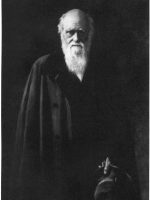
Darwin’s Solution for “Savagery”
At some future period, not very distant as measured by centuries, the civilised races of man will almost certainly exterminate and replace throughout the world the savage races. At the same time the anthropomorphous apes . . . will no doubt be exterminated. The break [between man and his nearest allies] will then be rendered wider, for it will intervene between man in a more civilised state, as we may hope, than the Caucasian, and some ape as low as a baboon, instead of as at present between the negro or Australian and the gorilla.”
– Darwin, The Descent of Man8
In arguing his case for what he called “Natural Selection,” Darwin could offer no clear observable examples from nature of what he was describing, so he argued by analogy in his chapter on “Variation under Domestication” (Origin Chapter 1.) The irony here is, of course, that he is arguing the case for unassisted natural descent by appealing to variation in plants and animals under the guiding hand of human beings over long periods of time. Beyond that, however, the variations he describes are possible only because the capacity is already present in the genetic makeup of the organisms in question, whether sheep or hyacinths. Nevertheless, even breeding guided by humans has its limits.
In the words of the French zoologist, Pierre Grassé, “In spite of the intense pressure generated by artificial selection . . . over whole millennia, no new species are born. . . . The fact is that selection gives tangible form to and gathers together all the varieties a genome is capable of producing, but does not constitute an innovative evolutionary process.”24
Contrast the limited ability of natural selection just described with Darwin’s claims. By “natural selection” he is referring to nature’s ability to select from among numerous variations, preserving “favourable variations” and rejecting “injurious” ones. Moreover, he claims that Nature “can act on every internal organ, on every shade of constitutional difference, on the whole machinery of life,”25 thereby moving the process of evolution ever forward. “Over all these causes of Change I am convinced that the accumulative action of Selection . . . is by far the predominant Power.”26 After describing the millennia of human attempts at breeding superior plants and animals, he writes, “We have seen that man by selection can certainly produce great results . . . . But Natural Selection . . . is as immeasurably superior to man’s feeble efforts, as the works of Nature are to those of Art.”27
Darwin did not stop there, however, for he wrote, “It may be said that natural selection is daily and hourly scrutinising, throughout the world, every variation, even the slightest; rejecting that which is bad, preserving and adding up all that is good; silently and insensibly working, whenever and wherever opportunity offers, at the improvement of each organic being in relation to its organic and inorganic conditions of life.”28 At the end of Origin he wrote, “And as natural selection works solely by and for the good of each being, all corporeal and mental endowments will tend to progress towards perfection.”29
Nature as God, or the God of Nature?
Doesn’t it strike you that, in trying to obviate the need for an intelligent Being’s involvement in the development of life, Darwin ascribes intelligence to Nature itself? In order to replace the Creator he no longer wished to deal with, he had to make Nature itself into a kind of demigod, an intelligent “force” set high upon a throne shrouded with a scientific aura. Whether you accept his claims or not, the result is the same. We have come full circle and are once again left facing the fact that, without intelligent intervention, life in all its beauty, variety, and complexity is impossible!
Consider then our modern tendency to acknowledge Evolution, or Mother Nature, or Father Time, or Mother Earth, etc., but not Almighty God. Consider this especially in light of what the apostle Paul wrote to the Romans almost 2,000 years ago:
“Although they knew God, they neither glorified him as God nor gave thanks to him, but their thinking became futile and their foolish hearts were darkened. Although they claimed to be wise, they became fools and exchanged the glory of the immortal God for images made to look like mortal man and birds and animals and reptiles.” (Romans 1:21-23)
In his Autobiography, Darwin wrote of his earlier years, “whilst standing in the midst of the grandeur of a Brazilian forest, ‘it is not possible to give an adequate idea of the higher feelings of wonder, admiration, and devotion which fill and elevate the mind.’ I well remember my conviction that there is more in man than the mere breath of his body.” Yet about his later years he writes, “But now the grandest scenes would not cause any such convictions and feelings to arise in my mind.”
In fact, as he entered his final months, the 73-year-old Darwin had descended to a notably melancholy and listless state of mind.30
Darwin made his choices regarding God and the origin of life, and did so with considerable intellectual dishonesty. No one, however, is required to take the same path that he did.
Christopher N. White, Calhoun ’87
© 2002 The Yale Standard Committee
Dwight
Darwinists Contradict Darwin
Strangely enough, intelligent design proponents can take great comfort from the words of none other than . . . Charles Darwin!
Strangely enough, intelligent design proponents can take great comfort from the words of none other than . . . Charles Darwin!
So noted Chuck Colson in a Breakpoint radio commentary addressing a recent Ohio Board of Education debate. In it, Lawrence Krauss from Case Western University, an evolutionist, along with a colleague squared off against two advocates of intelligent design.
At issue was whether the theory of intelligent design, which proposes that some form of intelligence, as opposed to random events, played a role in the development of life on Earth, should be allowed inside Ohio classrooms.
At one point in the session, Dr. Krauss dismissed his opponents, and intelligent design researchers generally, in so many words: “They’re not a part of science, what they’re really attacking here is not Darwinism but science.”
Dr. Krauss’s only problem is that proponents of intelligent design are very much a part of science, and their arguments are nothing if not scientific. For people like Jonathan Wells—Ph.D. in Molecular and Cell Biology from Berkeley and one of Dr. Krauss’s opponents—science is far from being an object of scorn; rather, it is one of their most potent tools of argument.
Which is to say that intelligent design supporters faced yet again the same boilerplate rejection they have faced continuously—because you oppose evolution, you are unfit to oppose evolution.
In all this Mr. Colson picked up on an irony far too tantalizing to ignore. He cited a passage from The Origin of Species written by the great patron of evolution himself:
“For I am well aware that scarcely a single point is discussed in this volume on which facts cannot be adduced, often apparently leading to conclusions directly opposite to those at which I have arrived. A fair result can be obtained only by fully stating and balancing the acts and arguments on both sides of each question.” (emphasis added)
Intelligent design scientists can but wistfully hope Darwin’s message gets through. However they may object to his scientific theory, they would unreservedly applaud Darwin’s scientific philosophy.
Here described is a dream world where theories are subject to debate, while the principles guiding that debate—allowing scientists a free and fair forum for airing differing opinions—are, frankly, undebatable.
When it comes to evolution, some scientists have frustratingly seen these ideas turned on their heads. The theory has become sacrosanct orthodoxy, not subject to any critical review, while the principles of inquiry have been attacked to remove from dissenters any basis for argument.
In the end, science is not science without vigorous debate. An unproved proposition that has been alchemized into de facto truth is nothing more than a dogma.
When it is then uncritically foisted onto the public—a public split nearly in half on the issue—it is in danger of degrading into propaganda.
Intelligent design scientists deserve a fair hearing, even if, as Dr. Krauss claimed, scientists were lined up 10,000 to 1 against it (an estimation conceivably driven more by enthusiasm than knowledge).
If The Origin of Species is really such a mighty explanation of our beginnings, its supporters should handily be able to withstand the feeble volley of arguments from whatever solitary rebel dares oppose the collective wisdom of 10,000 convinced evolutionists.
Dr. Wells’s point in the debate was simple. He stated, as paraphrased in The New York Times, “teachers should be entitled to plumb [evolutionary theory] as a matter of intellectual fairness.” Who knows. Even Darwin might have stood up to applaud that one.
Stephen J. Ahn, Jonathan Edwards ’96
© 2002 The Yale Standard Committee
sources
Sources
1. Webster’s New World Dictionary, College ed., (New York, World Publishing Co., 1964), p. 1305.
2. As quoted in Philip E. Johnson, Darwin on Trial, 2nd ed., (Downer’s Grove, Illinois, InterVarsity Press, 1993), p. 9.
3. Charles Darwin, The Origin of Species, (New York, Bantam Books, 1999), p. 7.
4. Frederick Crews, “Saving Us From Darwin,” The New York Review of Books, Oct. 4, 2001, p. 24.
5. Randal Keynes, Darwin, His Daughter, and Human Evolution, (New York, Riverhead Books, 2002), pp. 243-244.
6. Keynes, p. 252.
7. Charles Darwin, The Descent of Man, (Princeton, Princeton University Press, 1981), p. 200.
8. Darwin, The Descent of Man, p. 201.
9. Darwin, The Origin of Species, p. 4.
10. Webster’s New World Dictionary, p. 230.
11. Darwin, The Origin of Species, p. 158.
12. As quoted in Michael J. Behe, Darwin’s Black Box, (New York, The Free Press, 1996), p. 40.
13. David Berlinski, “The Deniable Darwin,” Commentary, June 1996, pp. 19-20.
14. Darwin, The Origin of Species, p. 230.
15. Berlinski, p. 22.
16. Darwin, The Origin of Species, p. 230.
17. As quoted in Judith Ann Schiff, “Learning by Doing,” Yale Alumni Magazine, November 2000, p. 80.
18. Darwin, The Origin of Species, p. 26.
19. Darwin, The Origin of Species, pp. 108-110.
20. Darwin, The Origin of Species, pp. 154-155.
21. Behe, p. 27.
22. Darwin, The Origin of Species, p. 55.
23. Behe, p. 28.
24. Johnson, p. 18.
25. Darwin, The Origin of Species, p. 71.
26. Darwin, The Origin of Species, p. 38.
27. Darwin, The Origin of Species, p. 53.
28. Darwin, The Origin of Species, p. 71.
29. Darwin, The Origin of Species, p. 399.
30. Richard Milner, “What’s It All About Alfred?,” Natural History, February 2002, p. 75.
Charles Colson, “What Would Darwin Say?: The Ohio Intelligent Design Controversy,” BreakPoint with Charles Colson, Commentary #020314 – 03/14/2002: see www.breakpoint.org;
Francis X. Clines, “Ohio Board Hears Debate on an Alternative to Darwinism,” The New York Times, March 12, 2002 (Late edition, final, section A, page 16, column 1).
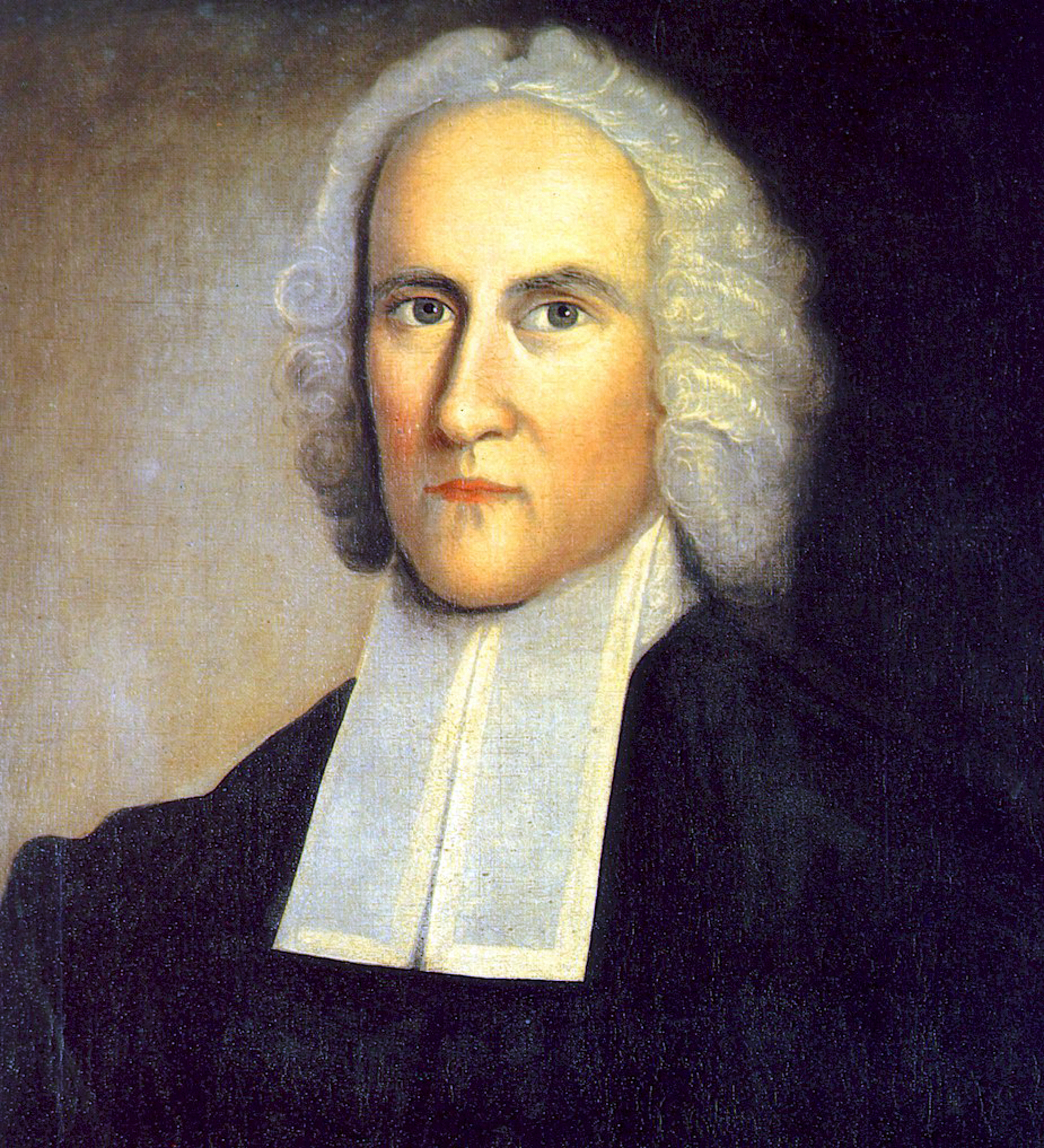
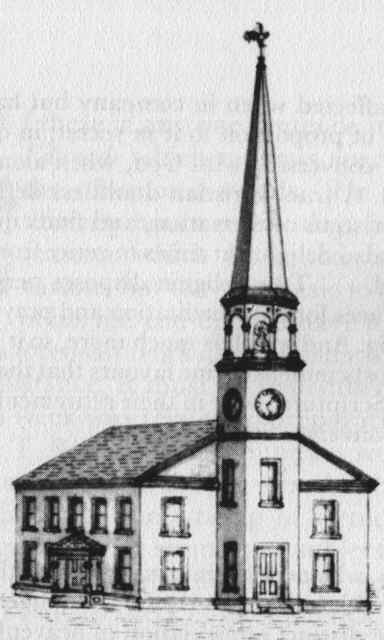
O sinner! consider the fearful danger you are in! It is a great furnace of wrath, a wide and bottomless pit, full of the fire of wrath that you are held over in the hand of that God whose wrath is provoked and incensed as much against you as against many of the damned in hell. ...And now you have an extraordinary opportunity, a day wherein Christ has thrown the door of mercy wide open, and stands in calling and crying with a loud voice to poor sinners; a day wherein many are flocking to him, and pressing into the kingdom of God. Many are daily coming from the east, west, north and south; many that were very lately in the same miserable condition that you are in, are now in a happy state, with their hearts filled with love to him who has loved them, and washed them from their sins in his own blood, and rejoicing in hope of the glory of God. How awful is it to be left behind at such a day! To see so many others feasting, while you are pining and perishing! To see so many rejoicing and singing for joy of heart, while you have cause to mourn for sorrow of heart, and howl for vexation of spirit! How can you rest one moment in such a condition? Are not your souls as precious as the souls of the people at Suffield, where they are flocking from day to day to Christ?
— Jonathan Edwards, from his sermon “Sinners in the Hands of an Angry God.”
